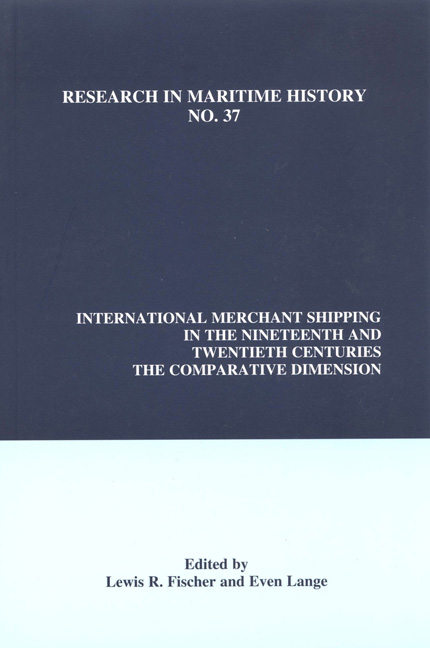Book contents
- Frontmatter
- Contents
- Contributors' Notes
- Contributors
- Introduction
- “Growth, Diversification and Globalization: Main Trends in International Shipping since 1850”
- “Norwegian Shipping in the Twentieth Century”
- “The Greek Shipping Sector, c. 1850-2000”
- “A Guide to the Emergence of Japan's Modern Shipping Industries”
- “British Shipping from the Late Nineteenth Century to the Present”
- “North of England Shipowners and Their Business Connections in the Nineteenth Century”
- “Network Structures, Processes and Dynamics: Inter-firm Cooperative Frameworks in the Shipping Industry”
Introduction
- Frontmatter
- Contents
- Contributors' Notes
- Contributors
- Introduction
- “Growth, Diversification and Globalization: Main Trends in International Shipping since 1850”
- “Norwegian Shipping in the Twentieth Century”
- “The Greek Shipping Sector, c. 1850-2000”
- “A Guide to the Emergence of Japan's Modern Shipping Industries”
- “British Shipping from the Late Nineteenth Century to the Present”
- “North of England Shipowners and Their Business Connections in the Nineteenth Century”
- “Network Structures, Processes and Dynamics: Inter-firm Cooperative Frameworks in the Shipping Industry”
Summary
Almost five centuries ago, the great Italian political philosopher Niccolo Machiavelli observed that “one change always leaves the way prepared for the introduction of another.” Machiavelli, of course, was writing about political transformations, and there is no evidence in any of his works that he ever turned his inquisitive mind to the topic of waterborne transport. Nonetheless, his insight that one shift leads ineluctably to even greater changes certainly is an apt way to think about the evolution of merchant shipping since the mid-nineteenth century.
Few observers of the marine transportation sector in the middle of the nineteenth century could possibly have been prepared for the exponential growth in the rate of change that reconfigured merchant shipping over the next 150 years. The repeal of the British Navigation Acts - a reflection of the replacement of the doctrine of mercantilism by a movement toward free trade - combined with a surge of technological innovation to lay the groundwork for a total transformation of the world economy and international trade. The merchant marine was at the heart of this process of globalization.
Between 1850 and 2000 virtually everything about the shipping sector was altered beyond virtually beyond recognition. In the middle of the nineteenth century the vast bulk of deep-sea trade was carried in wooden vessels propelled by the wind. Although ships and shipping had changed a great deal since the beginnings of the industrial revolution, the demand for reliable carrying capacity after 1850 spurred a veritable revolution. Wood was soon superseded by iron and steel, and improvements in boiler and engine technology led first to the dominance of steam by the 1880s and by the Second World War to the triumph of turbines and motor ships. Vessels became ever larger, more specialized and, for a time at least, faster. Cargo-handling was improved through the increasing use of mechanical devices both on ships and in ports, and the time required to load and discharge goods plummeted. After 1945 the introduction of giant tankers and a drive towards intermodalism culminated in the modern container vessel and a new emphasis on logistics which totally transformed the maritime sector.
- Type
- Chapter
- Information
- International Merchant Shipping in the Nineteenth and Twentieth CenturiesThe Comparative Dimension, pp. xiii - xviPublisher: Liverpool University PressPrint publication year: 2008

